Understanding the Black man requires empathy, communication, and a deep exploration of historical and societal influences that shape his identity and relationships.
The Importance of Empathy and Communication
Empathy and communication are foundational to understanding the Black man, as they bridge gaps and foster mutual respect. By actively listening and engaging in open dialogue, Black women can gain insight into the emotional and societal challenges Black men face. This connection helps dismantle misunderstandings and fosters a deeper appreciation for shared experiences. Communication becomes a tool for healing, allowing both parties to express their truths and vulnerabilities. Without empathy, relationships can become strained, as unspoken emotions and unaddressed pain may linger. By prioritizing these values, Black women and men can build a stronger, more resilient bond, rooted in understanding and compassion.
Breaking Down Stereotypes and Misconceptions
Breaking down stereotypes and misconceptions is essential for fostering genuine understanding between Black women and men. These preconceived notions, often rooted in historical oppression and systemic racism, can create barriers to meaningful connections. For instance, the portrayal of Black men as emotionally distant or hyper-aggressive in media perpetuates harmful stereotypes. Similarly, the idea that Black women are inherently dominant or combative can hinder mutual respect. By challenging these narratives through open dialogue and education, individuals can move beyond surface-level assumptions. This process requires a willingness to confront uncomfortable truths and embrace the complexity of Black masculinity and femininity. Doing so fosters empathy and collaboration.

Historical Context of Black Relationships
Centuries of slavery and systemic oppression have deeply influenced Black relationships, creating challenges in trust, communication, and unity between Black men and women.
The Impact of Slavery on Black Family Dynamics
Slavery profoundly disrupted Black family dynamics, causing separations, emotional trauma, and cultural disconnection. The transatlantic slave trade forcibly separated families, erasing cultural identities and creating lasting emotional scars; These historical wounds have influenced contemporary relationships, manifesting as communication challenges and trust issues. The absence of traditional family structures led to matriarchal households, often straining relationships between Black men and women. Healing requires acknowledging this historical trauma and fostering mutual understanding to rebuild trust and unity. The legacy of slavery continues to affect Black relationships, emphasizing the need for empathy and open dialogue to move forward collectively.
The Role of the Civil Rights Movement in Shaping Black Identity
The Civil Rights Movement played a pivotal role in reshaping Black identity, fostering pride and unity among Black individuals. It challenged systemic oppression and promoted self-dignity, encouraging Black men and women to reclaim their heritage and assert their rights. Leaders like Martin Luther King Jr. and Malcolm X inspired a generation to stand against discrimination, creating a sense of collective purpose. This era also highlighted the resilience and strength of Black communities, laying the groundwork for ongoing struggles against inequality. The movement’s legacy continues to influence Black identity, emphasizing empowerment, solidarity, and the pursuit of justice. It remains a cornerstone of Black cultural and social progress.
Systemic Oppression and Its Effects on Black Men
Systemic oppression has profoundly impacted Black men, perpetuating cycles of inequality and limiting opportunities. Historical injustices, such as slavery and segregation, have left lasting scars, influencing economic disparities, education, and healthcare access. Black men often face stereotyping and bias, which can lead to mental health challenges and strained relationships. The criminal justice system disproportionately targets them, contributing to mass incarceration and generational trauma. These systemic issues create barriers to emotional expression and trust, affecting personal and interpersonal dynamics. Understanding these challenges is crucial for fostering empathy and support in relationships, particularly between Black men and women. Addressing these injustices is essential for healing and building stronger connections.
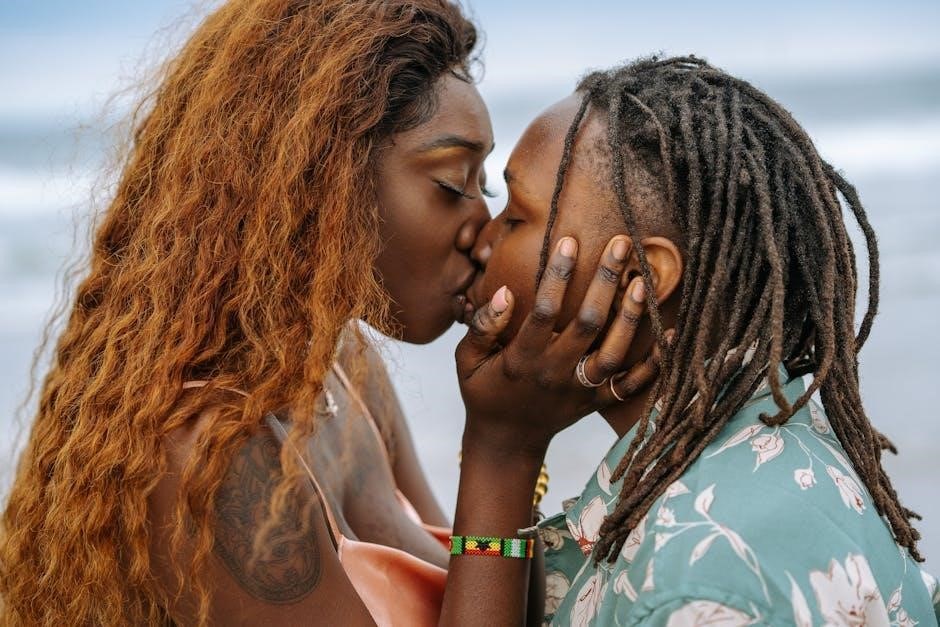
Societal Perceptions of Black Men
Society often views Black men through lenses of stereotypes and biases, shaped by media portrayal and historical narratives, influencing perceptions of their identity and relationships.
Media Portrayal and Its Influence on Black Masculinity
Media portrayal significantly shapes societal views of Black masculinity, often perpetuating stereotypes that emphasize aggression, hypersexuality, or criminality. These narratives, rooted in historical biases, influence how Black men are perceived and treated. Such portrayals can alienate Black women, fostering misunderstandings and mistrust. Books like Shahrazad Ali’s The Blackman’s Guide to Understanding the Blackwoman highlight these tensions, sparking debates about representation and identity. By critically analyzing media messages, Black women can better understand the pressures Black men face, fostering empathy and bridging gaps in communication. Recognizing these influences is crucial for building stronger, more supportive relationships.
Stereotypes Surrounding Black Men and Their Origins
Stereotypes about Black men often stem from historical and systemic oppression, perpetuating images of aggression, dominance, or irresponsibility. These narratives, deeply rooted in slavery and racism, have evolved over time, influencing societal perceptions. Books like The Blackman’s Guide to Understanding the Blackwoman address these stereotypes, urging Black women to critically examine their origins and impacts. Recognizing how these stereotypes distort Black masculinity is essential for fostering understanding and empathy. By tracing their historical roots, Black women can better navigate the complexities of relationships and challenge harmful misconceptions, promoting healthier connections and mutual respect.
The Struggle for Identity in a Biased Society
Black men often face a profound struggle for identity, shaped by societal biases and historical oppression. Books like The Blackman’s Guide to Understanding the Blackwoman highlight how these biases distort self-perception, creating internal conflict. The pressure to conform to stereotypes while seeking validation can lead to emotional turmoil. Black women play a crucial role in supporting this journey by fostering understanding and challenging harmful narratives; Recognizing the societal forces that shape Black masculinity helps bridge gaps in relationships. Through open dialogue and empathy, both partners can navigate these challenges, creating a foundation of mutual respect and shared growth.
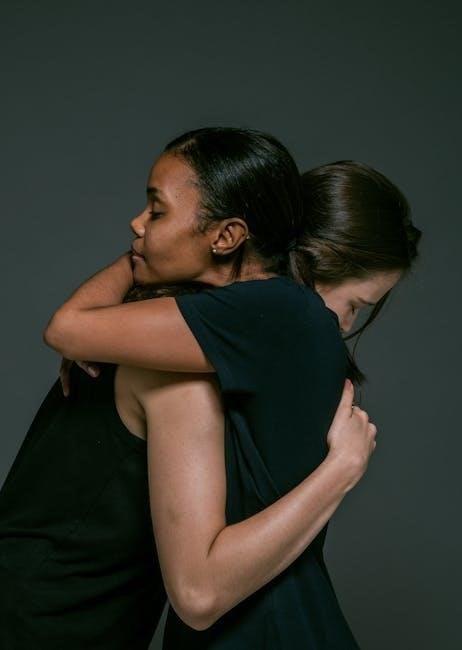
Communication Strategies for Black Women
Effective communication involves active listening and empathy, fostering deeper connections. Understanding the emotional landscape of Black men helps bridge gaps and strengthens relationships.
Active Listening and Its Role in Building Connections
Active listening is crucial for fostering understanding between Black women and men. By truly hearing and acknowledging each other’s perspectives, trust and empathy are strengthened, creating a foundation for meaningful relationships. This approach allows both partners to feel valued, which is essential for resolving conflicts and building stronger bonds. Through attentive listening, misunderstandings are minimized, and mutual respect is cultivated, paving the way for deeper emotional connections. It’s not just about hearing words but understanding the emotions and experiences behind them, fostering a supportive and loving environment for both individuals to thrive. This practice is vital for nurturing healthy and fulfilling relationships.
Verbal and Non-Verbal Communication Styles
Effective communication between Black women and men involves understanding both verbal and non-verbal cues. Verbal communication requires clarity, respect, and emotional intelligence to convey thoughts and feelings accurately. Non-verbal signals, such as body language, eye contact, and tone, also play a significant role in expressing intentions and emotions. Cultural and personal experiences often shape these communication styles, and being aware of these differences can help bridge gaps. Misinterpretations can lead to misunderstandings, so paying attention to both forms of expression is vital. By fostering open and honest dialogue, both partners can better navigate their interactions, building trust and fostering deeper connections. This mutual understanding strengthens relationships and promotes harmony.
How to Navigate Difficult Conversations
Navigating difficult conversations between Black women and men requires patience, empathy, and a willingness to address sensitive topics openly. It’s important to approach these discussions with respect, ensuring both parties feel heard and validated. Active listening is crucial, as is avoiding assumptions and focusing on understanding each other’s perspectives. Setting boundaries and ground rules for the conversation can help maintain clarity and prevent escalation. Acknowledging past traumas and societal influences can also provide context and foster deeper understanding. By addressing issues constructively, both partners can work toward resolution and strengthened connections, ultimately fostering growth and unity in the relationship. This approach encourages mutual respect and empathy.

Emotional and Psychological Connections
Emotional resilience and shared experiences create a foundation for deeper connections, fostering empathy and understanding between Black women and men in their relationships and interactions.
Understanding the Emotional Landscape of Black Men
Black men’s emotional landscapes are shaped by societal expectations, historical trauma, and systemic oppression, often leading to suppressed emotions and a need for safe spaces to express vulnerability. Their experiences, rooted in resilience, reveal a complex interplay of strength and hidden struggles. Understanding this requires empathy and recognition of the cultural and psychological barriers they face. By fostering open dialogue and trust, Black women can connect on a deeper level, helping to heal and build stronger, more supportive relationships. This mutual understanding is crucial for fostering emotional harmony and unity. It’s about seeing beyond the surface and embracing the full spectrum of their humanity.
Vulnerability and Trust in Relationships
Vulnerability and trust are cornerstone elements in fostering meaningful connections between Black men and women. Historically, societal expectations have often discouraged Black men from expressing vulnerability, leading to emotional suppression. Building trust requires creating safe spaces for open communication, where both partners feel valued and heard; The Black woman’s guide emphasizes the importance of understanding that vulnerability is a sign of strength, not weakness. By fostering trust, couples can navigate challenges together, strengthening their bond. This mutual support system allows both individuals to grow emotionally and intellectually, fostering a deeper connection. Trust becomes the foundation for resilience in the face of external pressures and internal doubts, enabling authentic and lasting relationships. Empathy and patience are key to nurturing this vital aspect of partnership.
Mental Health Awareness and Its Impact on Relationships
Mental health awareness is crucial for fostering healthy relationships, particularly within the Black community. Historical trauma, systemic oppression, and societal pressures have left lasting impacts on the mental well-being of Black men. These challenges often manifest as emotional barriers, affecting communication and intimacy. The stigma surrounding mental health within the community can discourage Black men from seeking help, further straining relationships. Open dialogue and empathy are essential for creating a supportive environment. Understanding these dynamics helps Black women approach relationships with compassion, fostering healing and growth. By addressing mental health collectively, couples can build stronger, more resilient relationships rooted in mutual understanding and support.
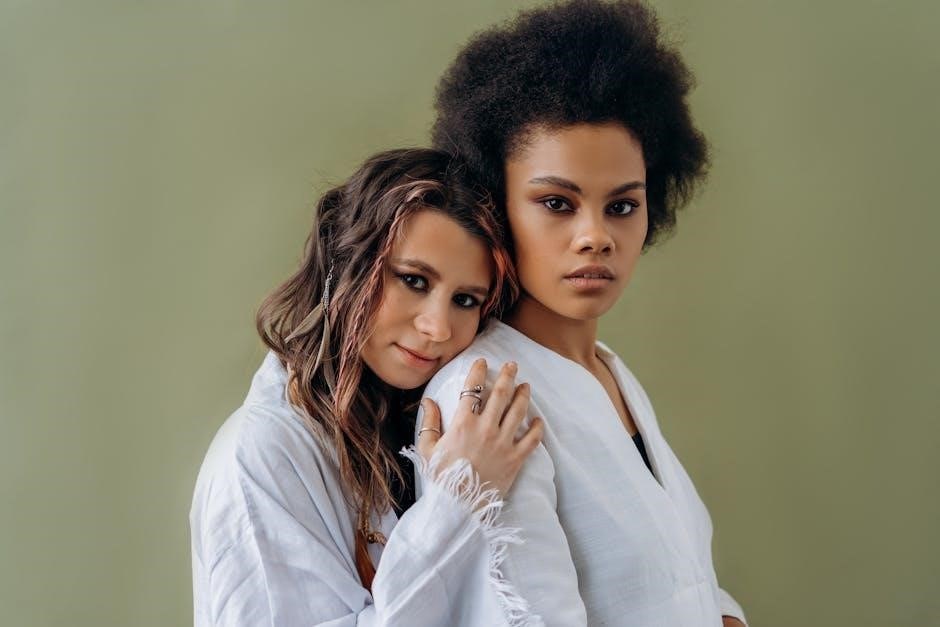
Mutual Respect and Understanding
Mutual respect and understanding are foundational for strengthening relationships, fostering trust, and valuing each other’s voices and perspectives in a shared journey of growth and unity.
The Importance of Respect in Building Strong Relationships
Respect is the cornerstone of any healthy relationship, fostering mutual understanding and trust. It involves acknowledging each other’s dignity, values, and boundaries, creating a safe space for open communication. When both partners feel respected, they are more likely to express their true selves, leading to deeper emotional connections. Respect also encourages empathy and active listening, which are essential for resolving conflicts and navigating challenges together. By prioritizing respect, couples can build a foundation of trust and admiration, allowing their relationship to grow stronger over time. This mutual regard not only strengthens individual bonds but also promotes a culture of appreciation and support, essential for long-term harmony and resilience.
Recognizing Shared Experiences and Challenges
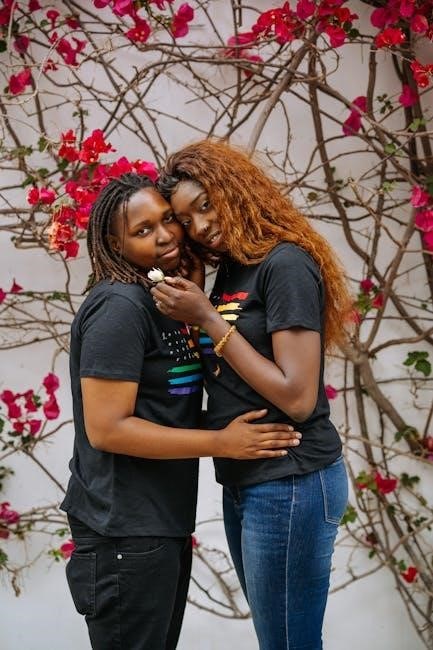
Shared experiences and challenges form a unique bond between Black men and women, rooted in their collective history and societal struggles. Understanding these commonalities fosters empathy and unity, helping them navigate obstacles together. Both have faced systemic oppression, stereotypes, and cultural biases, creating a shared resilience. Acknowledging these experiences allows for open dialogue and mutual support, strengthening their relationship. By recognizing the struggles they both endure, they can work collaboratively to overcome them, building trust and understanding. This shared journey not only deepens their connection but also empowers them to confront challenges with a united front, fostering a stronger sense of community and shared purpose.
How to Foster a Culture of Mutual Support
Fostering a culture of mutual support involves creating an environment where both Black men and women feel valued and empowered. Active listening and open communication are key, allowing each partner to express their needs and concerns without judgment. Encouraging shared goals and collaborative efforts helps build trust and unity. Celebrating each other’s strengths while addressing weaknesses fosters a sense of teamwork and respect. Additionally, acknowledging and learning from past experiences can prevent recurring challenges. By prioritizing empathy and understanding, both partners can create a supportive system that promotes growth and harmony in their relationship. This mutual support system strengthens their bond and fosters resilience against external pressures.

Personal Growth and Development
Personal growth involves self-awareness, healing from past traumas, and embracing independence while nurturing partnerships, fostering emotional well-being and empowerment in both Black men and women.
The Role of Self-Awareness in Relationships
Self-awareness is crucial in relationships, as it fosters understanding of one’s emotions, behaviors, and triggers. By recognizing personal patterns and vulnerabilities, individuals can communicate more effectively and empathetically. This mutual understanding helps both partners navigate challenges and build a stronger connection. Self-awareness also encourages accountability, allowing individuals to address their own flaws and growth areas. In the context of Black relationships, this introspection can help heal historical wounds and dismantle harmful cycles. By fostering emotional intelligence and introspection, self-awareness becomes a foundation for healthier, more resilient relationships. It promotes personal growth and empowers individuals to contribute positively to their partnerships, fostering unity and understanding.
Healing from Past Traumas and Experiences
Healing from past traumas is essential for fostering healthy relationships, as unresolved wounds can create emotional barriers. Black men often carry the weight of historical oppression, systemic racism, and societal expectations, which can manifest as pain, anger, or mistrust. Acknowledging these experiences and seeking healing is a critical step toward building stronger connections. This process involves open communication, empathy, and mutual understanding. By addressing these traumas, individuals can release burdens and create space for emotional growth. Healing not only benefits the individual but also strengthens relationships, allowing for a more supportive and loving environment. It is a journey that requires patience, vulnerability, and a willingness to confront the past.
Cultivating Independence While Maintaining Partnership
Cultivating independence within a partnership is crucial for a healthy and balanced relationship. Both Black men and women should prioritize personal growth, interests, and goals while nurturing their connection. Independence fosters mutual respect and prevents codependency, allowing each partner to thrive individually and collectively. It encourages self-awareness, financial autonomy, and emotional resilience, which are vital for long-term stability. By maintaining individual identities, couples can avoid losing themselves in the relationship and instead bring their best selves to the partnership. This balance ensures that the relationship remains dynamic, supportive, and fulfilling for both parties, fostering a sense of unity without sacrificing personal freedom or aspirations.

Navigating Challenges in Relationships
Navigating challenges requires open communication, empathy, and mutual respect. Understanding each other’s struggles fosters resilience and unity, helping Black couples overcome obstacles together.
Addressing Power Dynamics and Control Issues
Power dynamics and control issues often stem from historical and societal imbalances. Open dialogue helps partners recognize and balance these forces, fostering equality and mutual respect in relationships. Addressing these issues requires empathy and understanding, allowing both individuals to express their needs without fear of judgment. By acknowledging the root causes, such as systemic oppression and past traumas, couples can work together to create a more balanced and supportive partnership. This process strengthens trust and fosters a healthier relationship dynamic, where both partners feel valued and heard. Communication is key to navigating these challenges and building a stronger bond.
Overcoming Financial and Career-Related Stress
Financial and career-related stress can strain relationships, especially when paired with societal pressures. Open conversations about financial goals and challenges help alleviate tension. Creating a shared budget and prioritizing needs over wants fosters teamwork. Encouraging mutual support in career aspirations builds trust and unity. Addressing these stresses requires patience, understanding, and a collaborative approach to ensure both partners feel heard and valued. By working together, couples can navigate economic challenges and strengthen their bond, fostering resilience and long-term stability in their relationship.
Managing External Pressures and Influences
External pressures, such as societal expectations and media portrayals, can significantly impact relationships. Black men and women often face unique challenges due to systemic biases and cultural stereotypes. These influences can create misunderstandings and stress, affecting communication and trust. To manage these pressures, it’s essential to foster open dialogue and mutual support. By acknowledging and addressing external biases, couples can work together to build resilience. Setting boundaries and focusing on shared values helps mitigate the impact of outside influences. Cultivating a strong, supportive partnership allows both individuals to navigate societal challenges effectively, fostering a deeper understanding and connection.
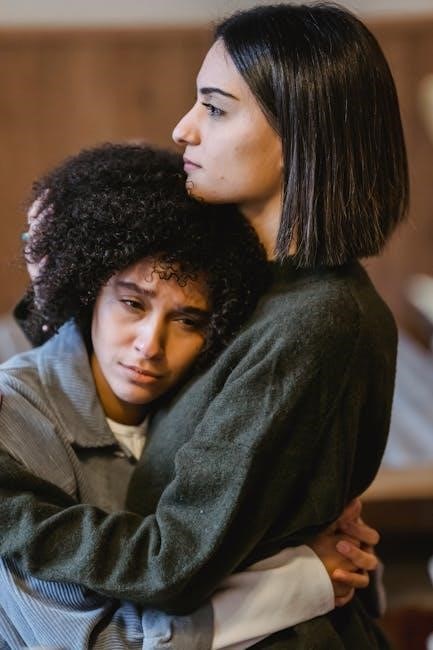
Fostering Unity and Togetherness
Unity and togetherness are cultivated through mutual respect, shared goals, and open communication, strengthening the bond between Black men and women.
Building a Shared Vision for the Future
Creating a shared vision for the future involves collaboration and mutual understanding between Black men and women. By acknowledging each other’s strengths and challenges, they can align their goals and work towards collective progress. This shared vision fosters unity and purpose, helping to overcome societal obstacles. Open dialogue and empathy are key to building this vision, ensuring both partners feel heard and valued. A unified approach not only strengthens relationships but also empowers the community to thrive. Through shared goals, Black men and women can create a brighter, more equitable future together.
Creating a Supportive and Loving Environment
Fostering a supportive and loving environment requires intentional effort from both Black men and women. By prioritizing empathy, understanding, and open communication, they can build a space where each individual feels valued. Trust and vulnerability are essential components, allowing both partners to express their emotions and needs without fear of judgment. This environment not only strengthens emotional bonds but also promotes personal growth and mutual respect. When both individuals feel supported, they are better equipped to navigate life’s challenges together, creating a foundation of love and resilience that benefits the entire family and community.
Celebrating Strengths and Overcoming Weaknesses
Celebrating Strengths and Overcoming Weaknesses
Celebrating strengths fosters confidence and unity, while addressing weaknesses with empathy promotes growth. Acknowledging the positive traits in Black men, such as resilience and determination, builds a foundation of appreciation. Simultaneously, approaching weaknesses with compassion and understanding allows for constructive dialogue and healing. By focusing on collective strength, both partners can support each other’s personal and relational development. Celebrating achievements and progress, no matter how small, reinforces a culture of encouragement. This balanced approach not only strengthens the bond between Black men and women but also contributes to the broader goal of unity and resilience within the community, emphasizing the importance of mutual upliftment and shared success.
The journey of understanding fosters growth, unity, and resilience. Empathy, communication, and mutual respect pave the path for a harmonious and progressive future for Black women and men.
The Path Forward for Black Women and Men
The path forward lies in fostering unity, mutual respect, and open communication. By addressing past traumas and societal challenges, Black women and men can build a stronger, supportive community. Healing and growth are essential for creating a future where both genders thrive together. Embracing shared experiences and challenges fosters a culture of understanding and collaboration. This journey requires commitment to empathy, self-awareness, and collective progress, ensuring a brighter future for generations to come.
Embracing the Journey of Understanding and Growth
Embracing the journey of understanding and growth involves self-reflection, open dialogue, and a willingness to learn from each other. Black women and men must confront their respective challenges and work together to dismantle harmful stereotypes and misconceptions. By fostering empathy and mutual respect, they can create a foundation for healthier relationships and a united community. This journey requires patience, vulnerability, and a commitment to personal and collective development. Through shared experiences and a deeper understanding of each other, Black women and men can navigate societal pressures and build a future rooted in strength, unity, and mutual support.

